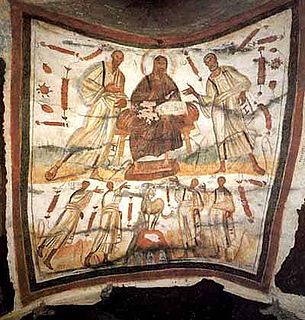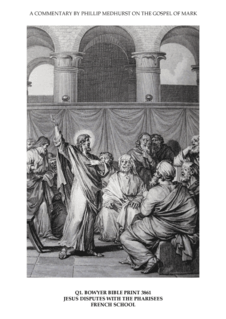
The word catholic comes from the Greek phrase καθόλου katholou 'on the whole, according to the whole, in general', and is a combination of the Greek words κατά 'about' and ὅλος 'whole'. The first use of "Catholic" was by the church father Saint Ignatius of Antioch in his Letter to the Smyrnaeans. In the context of Christian ecclesiology, it has a rich history and several usages.

Epictetus was a Greek Stoic philosopher. He was born into slavery at Hierapolis, Phrygia and lived in Rome until his banishment, when he went to Nicopolis in northwestern Greece for the rest of his life. His teachings were written down and published by his pupil Arrian in his Discourses and Enchiridion.

Julian was Roman emperor from 361 to 363, as well as a notable philosopher and author in Greek. His rejection of Christianity, and his promotion of Neoplatonic Hellenism in its place, caused him to be remembered as Julian the Apostate in Christian tradition.

In Christianity, Jesus is the Son of God and in mainstream Christian denominations he is the incarnation of God the Son, the second person in the Trinity. He is believed to be the Jewish messiah who is prophesied in the Hebrew Bible, which is called the Old Testament in Christianity. It is believed that through his crucifixion and subsequent resurrection, God offered humans salvation and eternal life, that Jesus died to atone for sin to make humanity right with God.

Most scholars who study the historical Jesus and early Christianity believe that the canonical gospels and the life of Jesus must be viewed within their historical and cultural context, rather than purely in terms of Christian orthodoxy. They look at Second Temple Judaism, the tensions, trends, and changes in the region under the influence of Hellenism and the Roman occupation, and the Jewish factions of the time, seeing Jesus as a Jew in this environment; and the written New Testament as arising from a period of oral gospel traditions after his death.

The life of Jesus in the New Testament is primarily outlined in the four canonical gospels, which includes his genealogy and nativity, public ministry, passion, prophecy, resurrection and ascension. Other parts of the New Testament – such as the Pauline epistles which were likely written within 20 to 30 years of each other, and which include references to key episodes in Jesus' life, such as the Last Supper, and the Acts of the Apostles, which includes more references to the Ascension episode than the canonical gospels - also expound upon the life of Jesus. In addition to these biblical texts, there are extra-biblical texts that Christians believe make reference to certain events in the life of Jesus, such as Josephus on Jesus and Tacitus on Christ.

The Christ myth theory, also known as the Jesus myth theory, Jesus mythicism, or the Jesus ahistoricity theory, is the view that "the story of Jesus is a piece of mythology", possessing no "substantial claims to historical fact". Alternatively, in terms given by Bart Ehrman paraphrasing Earl Doherty, "the historical Jesus did not exist. Or if he did, he had virtually nothing to do with the founding of Christianity." Views that "the historical Jesus did not exist" are rejected as fringe theories by virtually all scholars of antiquity.

Matthew 2:23 is the twenty-third verse of the second chapter of the Gospel of Matthew in the New Testament. The young Jesus and the Holy Family have just returned from Egypt and in this verse are said to settle in Nazareth. This is the final verse of Matthew's infancy narrative.

Generically, a Galilean is an inhabitant of Galilee, a region of Israel surrounding the Sea of Galilee (Kinneret).The New Testament notes that the Apostle Peter's accent gave him away as a Galilean. The Galilean dialect referred to in the New Testament was a form of Jewish Palestinian Aramaic spoken by people in Galilee from the late Second Temple period (530 BCE) through the Apostolic Age (c. 100 CE). Later the term was used to refer to the early Christians by Roman emperors Julian and Marcus Aurelius, among others.

The New Testament narrative of the life of Jesus refers to a number of locations in the Holy Land and a Flight into Egypt. In these accounts the principal locations for the ministry of Jesus were Galilee and Judea, with activities also taking place in surrounding areas such as Perea and Samaria.

In the Christian gospels, the ministry of Jesus begins with his baptism in the countryside of Roman Judea and Transjordan, near the river Jordan by John the Baptist, and ends in Jerusalem, following the Last Supper with his disciples. The Gospel of Luke states that Jesus was "about 30 years of age" at the start of his ministry. A chronology of Jesus typically has the date of the start of his ministry September 11 26AD, others have estimated at around AD 27–29 and the end in the range AD 30–36.

There are a number of episodes in the New Testament in which Jesus was rejected. Jesus is rejected in Judaism as a failed Jewish messiah claimant and a false prophet by most Jewish denominations.

In Christianity, the Logos is a name or title of Jesus Christ, seen as the pre-existent second person of the Trinity. In the Douay–Rheims, King James, New International, and other versions of the Bible, the first verse of the Gospel of John reads:
In the beginning was the Word, and the Word was with God, and the Word was God.

This is a glossary of terms used in Christianity.

Christians are people who follow or adhere to Christianity, a monotheistic Abrahamic religion based on the life and teachings of Jesus Christ. The words Christ and Christian derive from the Koine Greek title Christós (Χριστός), a translation of the Biblical Hebrew term mashiach (מָשִׁיחַ).

Cynicism is a school of thought of ancient Greek philosophy as practiced by the Cynics. For the Cynics, the purpose of life is to live in virtue, in agreement with nature. As reasoning creatures, people can gain happiness by rigorous training and by living in a way which is natural for themselves, rejecting all conventional desires for wealth, power, and fame, and even flouting conventions openly and derisively in public. Instead, they were to lead a simple life free from all possessions.

Stoicism is a school of Hellenistic philosophy founded by Zeno of Citium in Athens in the early 3rd century BC. It is a philosophy of personal eudemonic virtue ethics informed by its system of logic and its views on the natural world, asserting that the practice of virtue is both necessary and sufficient to achieve eudaimonia—flourishing by means of living an ethical life. The Stoics identified the path to eudaimonia with a life spent practicing the cardinal virtues and living in accordance with nature.

Nazarene is a title used to describe people from the city of Nazareth in the New Testament, and is a title applied to Jesus, who, according to the New Testament, grew up in Nazareth, a town in Galilee, now in northern Israel. The word is used to translate two related terms that appear in the Greek New Testament: Nazarēnos ('Nazarene') and Nazōraios ('Nazorean'). The phrases traditionally rendered as "Jesus of Nazareth" can also be translated as "Jesus the Nazarene" or "Jesus the Nazorean", and the title Nazarene may have a religious significance instead of denoting a place of origin. Both Nazarene and Nazorean are irregular in Greek and the additional vowel in Nazorean complicates any derivation from Nazareth.
Against the Galileans, meaning Christians, was a Greek polemical essay written by the Roman emperor Julian, commonly known as Julian the Apostate, during his short reign (361–363). Despite having been originally written in Greek, it is better known under its Latin name, probably due to its extensive reference in the polemical response Contra Julianum by Cyril of Alexandria.
A Galilean is a person from Galilee, a region of northern Israel and southern Lebanon

















